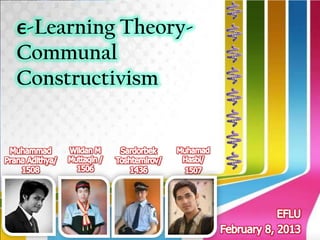
E learning theory
- 2. The theoretical underpinning of ϵ-Learning Learning theory itself is prime for development. e-Learning takes the concept of “community of learners”. “Communal constructivism”- individuals not only learn socially but contribute to other learners.
- 3. e-Learning has limitations: 1. The fixed times 2. Locations for learning However, e-Learning is simply an add-on in the technology itself
- 4. The concepts of e-Learning have emerged from: 1. A number of different traditions and fields 2. Education 3. Psychology 4. Computer science 5. Sociology
- 6. Three main theoretical frameworks underpinning educational and e- Learning theory: Behaviourism
- 7. The best known proponents of the approach:
- 8. COGNITIVISM
- 9. The most prominent theorists of Cognitivist approaches:
- 10. Sensory-motor skills: 0-2 years; reaching, touching and so on Pre-operational: 2-7 years; linguistic development, intuitive understanding of some simple processes Concrete operations: 7-11 years; organized thinking, problem solving with “real” contexts Formal operations: 11-15 years; abstract conceptualization and formal logic
- 11. The learner`s steps: implying that some learning capabilities are dependent on the consolidation of others David Wood introduces the concept of “scaffolding” Scaffolding is considered as part of the tutor`s role
- 13. Sample Websites 1. https://www.cs.tcd.ie/publications/tech- reports/reports.01/TCD-CS-2001-04.pdf 2. http://searchwarp.com/swa596784- Educational-Implications-Of-Theory-Of- Communal-Constructivism.htm 3. e-Learning Theory – Communal Constructivism : SAGE Knowledge knowledge.sagepub.com/view/e- learning/n5.xml 4. E-learning: concepts and practice - University of East London www.uel.ac.uk/rite/issues/vol1/2/bookreview/p p34/
- 16. EVOLVED
- 17. Socio—constructivist model requires a third dimension to the interaction Learner
- 19. http://www.simplypsychology.org/vygotsky.html 1. Vygotsky places more emphasis on culture. 2. Vygotsky places considerably more emphasis on social factors. 3. Vygotsky places more (and different) emphasis on the role of language in cognitive development
- 20. • Communal Constructivism is an approach to learning in which students construct their own knowledge as a result of their experiences and interactions with others and are afforded the opportunity to contribute this knowledge to a communal knowledge base for the benefit of existing and new learners (Holmes, 2001)
- 21. ‘a river and a pipe’
- 22. Two analogies, of water flowing in a river and in a pipe, illustrate the basic tenet of communal constructivism.
- 24. or
- 25. Salomon, G. and Perkins, D. (1998)
- 26. The concept of PhD study The concept of PhD study is that of the students making a contribution to the field they are studying. Doctoral students attempt to expand knowledge in a discipline and are encouraged to publish their results so that their own work is recorded and helps develop the field of knowledge. the doctoral study is arguably one of the best learning experiences available, especially if it is undertaken in a team context such as a science research group
- 28. They represent a significant move forward for e-Learning, based on communities of users/learners in a communal constructivist context.
- 29. form of e-Learning exemplified by weblogs (blog) http://languagepie.wordpress.com/
- 30. form of e-Learning exemplified by multi-user object oriented systems (MOO) http://www.angelfire.com/ma/CasaDax/moo.html
- 31. form of e-Learning exemplified by multi-editor wiki systems (wiki). http://web20andlanguagelearning.wikidot.com/wi kis
- 33. SEEDS OF CHANGE! To learn with and from others Peer tutoring and project-based learning in a group Conventional educational process will become increasingly vulnerable to change in the face of communal constructivist approaches stimulated by e-learning environments.
- 34. REFERENCES Holmes, Bryan, and John Gardner. E-Learning: Concepts and Practice. New Delhi: SAGE Publication Ltd, 2006. Holmes, Bryan, et al. Communal Constructivism: Students constructing learning for as well as with others. Ireland: Trinity College Dubin. (2001), https://www.cs.tcd.ie/publications/tech- reports/reports.01/TCD-CS-2001-04.pdf as on 6 February 2013. The modern Language Association of America. MLA Handbook for Writers of Research Paper. Seventh edition. New Delhi: EWP. 2006. Print Onike, Rahaman,. Educational Implications of Theory of Communal Constructivism. (2010),http://searchwarp.com/swa596784- Educational-Implications-Of-Theory-Of-Communal- Constructivism.html as on 6 February 2013 Sammons, Aldans. Approaches to Psychology. http://www.psychlotron.org.uk/newResources/approaches/AS_AQB _approaches_BehaviourismBasics as on 6 February 2013 Silverthorn, Pam. Jean Peaget’s Theory of Development. (1999) http://members.iinet.net.au/~aamcarthur/4_Mar_2008_files/Piagets_ Theory_of_Development.pdf as on 6 February 2013
- 36. Why is making it social valuable? Which is better? Why? Getting it from a peer… Or getting it from a teacher?
- 37. How to design d Multi-user Object i s Oriented systems c u (MOO)? s s i o n
